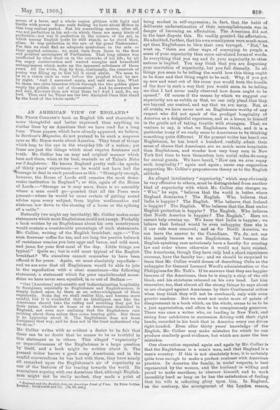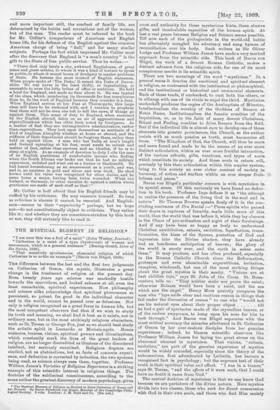AN AMERICAN VIEW OF ENGLAND.* Mn. PRICE COLLIER'S book on
English life and character is more thoughtful and better expressed than anything on similar lines by an American that we have read for a long time. These papers, which have already appeared, we believe, in Scribner's Magazine, do not pretend to be such a magnum opus as Mr. Bryce wrote about America. They treat of things which leap to the eye in the everyday life of a nation; yet these are just the things which most require freshness and truth. Mr. Collier has an easy and original manner which here and there, when at its best, reminds us of Taine's Notes Bur l'Angleterre. He knows England pretty well—he speaks of thirty years' experience—or he would not have had the liourage to deal in such paradoxes as this : "Strangely enough, however, the House of Lords still remains the most demo- cratic institution in England " ; or this, again of the House of Lords :—" Strange as it may seem, there is no assembly where a man could go—granted that all the Peers were present—where he would be more certain of getting sound advice upon every subject, from higher mathematics and abstruse law down to the shoeing of a horse or the splicing of a cable."
Naturally (we might say inevitably) Mr. Collier makes some statements which most Englishmen could not accept. Probably a book written by an Englishman about his own countrymen would contain a considerable percentage of such statements. Mr: Collier, writing of the English breakfast, says :—" You soon forswear coffee for tea, and ere long the passive bulwark of resistance wearies you into eggs and bacon, and cold meat, and jams, for your first meal of the day. Little things are typical." Quite so; but is cold meat typical of the English breakfast? We ourselves cannot remember to have been offered it for years. Again, we must absolutely repudiate— and we are sure that all Englishmen would be able to join in the repudiation with a clear conscience—the following statement, a statement which for pure unadulterated moon- shine we have never seen equalled, in or out of Bedlam :— "Our [American] enthusiastic and indiscriminating hospitality to foreigners, especially to Englishmen and Englishwomen, is simply looked upon by them as an acknowledgment of their superiority. Some day we shall realize this, and become more careful, but it is wonderful that an intelligent race like the Americans should take the cuffing and snubbing they get for their pains, whether at home or as Americans domiciled in England, not even now realizing that the Englishmen care nothing about them unless they come bearing gifts. But there is no hypocrisy about it. The Englishman does not treat foreigners that way, and he does not in the least understand why we do so."
Mr. Collier writes with so evident a desire to be fair that there can be no doubt that be moans to be as truthful in this statement as in others. This alleged "superiority" or superciliousness of the Englishman is a large question by itself, and a book might be written about it. The Present wilier knows a good many Americans, and in the candid conversations he has had with them, they have nearly all remarked upon the Englishman's air of superiority as one of the features of his bearing towards the world. He remembers arguing with one American that, although English- men might not be really modest, they made a point of
• Enoiand and the Engltah from an American Point of View. By Price Collier. London; Duckworth and Co. L7s. 6d. not.] being modest in self-expression; in fact, that the habit of deliberate underestimation of their accomplishments was in danger of becoming an affectation. The Americau did not in the least dispute this. He readily granted the affectation. He admitted, further, that his own countrymen were muob more apt than Englishmen to blow their own trumpet. "But," he went on, "there are other ways of conveying to people a sense of your superiority than mere calculated forms of words. In everything that you say and do your superiority to other nations is implied. You may think that you are disguising your conviction of superiority, but you fail dismally. In all things you seem to be telling the world how this thing ought to be done and that thing ought to be said. Why, if you got up now and went out of the room you would turn the handle of the door in such a way that you would seem to be telling me that I had never really observed how doors ought to be opened." Of course if the means by which we suggest our superiority are as subtle as that, we can only plead that they are beyond our control, and say that we are sorry. But, at all events, we have never met an Englishman worthy of any respect who did not speak of the prodigal hospitality of America as a delightful experience, and as a lesson, to himself in the gentle art of taking trouble with strangers. That, we venture to say, is what we Englishmen think, and it is a particular irony if we really seem to Americans to be thinking something quite different. If the present writer has heard one Englishman, he has heard a hundred ruefully admit their sense of shame that Americans are so much more hospitable than Englishmen, and wonder how very busy men in New York find time to turn themselves into social aides-de-camp for casual guests. We have beard, "How can we aver repay such hospitality P" again and again ; never any suggestion supporting Mr. Collier's preposterous theory as to the English attitude.
An alleged involuntary "superiority," which may obviously be very offensive to others, must be distinguished from another kind of superiority with which Mr. Collier also charges us. "'Who," he says, "believes that the world is better where England dominates ? The English. Who, believes that India is happier P The English. Who believes that Ireland is happier P The English. Who believes that the East under English protection is happier ? The English. Who believes that North America is happier? The English." Here we cannot help owning up. We know that India is happier ; we believe that Ireland would be even unhappier than she is if our rule were removed; and as for North America, we
can leave the answer to the Canadians. We. do not say this merely because we are Englishmen, but because the English-speaking race notoriously have a faculty for creating law and order where otherwise it would not have existed.
The Americans, though they have only had a short experience overseas, have the faculty too ; and we should be surprised to learn that Mr. Collier would dream of describing Cuba as the unhappier for General Leonard Wood's administration or the Philippines for Mr. Taft's. If he answers that they are happier because of the Americans, than be is simply a chip . of the old block, and his strictures rebound on his own head. Let him remember, too, that almost all the strong things be says about us are charged against Americans by their Continental critics when they think they will not be overheard, only with even greater candour. But we must not make more of points of disagreement in a book which, on the whole, seems to us to be a just appreciation, and often to be conspicuously generous. There was once a writer who, on landing in New York, and seeing four cabdrivers in succession driving with their right hands, recorded in his book that in America every one drives right-handed. Even after thirty years' knowledge of the English, Mr. Collier may make mistakes for which be can produce similarly good evidence, but which are none the less mistakes.
One observation repeated again and again by Mr. Collier is that the Englishman is a man's man, and that England is a
man's country. If this is not absolutely true, it is certainly
quite true enough to make a perfect contrast with American practice. In America the family, in social respects, is best represented by the women, and the husband is willing and proud to make sacrifices, to obscure himself, and to work incredibly hard so long as he has the satisfaction of feeling that his wife is reflecting glory upon him. In England, on the contrary, the arrangement of the London season, and more important still, the conduct of family life, are determined by the habits and recreations not of the woman, but of the man. The reader must be referred to the book for Mr. Collier's comparisons of American and English borne life, for his defence of the English against the common American charge of being "dull," and for many similar subjects. Perhaps the fact which impressed Mr. Collier most after the discovery that England is "a man's country" is the gift to the State of free public service. Thus he writes :— "There died only lately a shy, awkward Englishman, of great name and great estates, to whom it was a kind of torture to speak in public, to whom it meant hours of drudgery to master problems of State. He became the most trusted of English statesmen. When people spoke of 'The Duke,' it meant the Duke of Devon- shire. He was never in the least shifty, or ingratiating, or amenable to even the lofty bribes of office or ambition. He held a brief for England, and made no fuss about it. He was typical of the class, which, numbering its thousands far less conspicuous than he, do the work of England because they consider it a duty. When England arrives at her Pass at Thermopylfe, this large class will have to be reckoned with, and I venture to prophesy that there will not be even one left to tell the news, if things go against them. This sense of duty to England, when exercised by the English abroad, takes on an air of aggressiveness and superciliousness which has often boon noted by foreigners. As a Matter of fact they are unimaginative administrators, rather than supercilious. They look upon themselves as sentinels of a kind of Anglican Almighty whether at home or abroad, and the stiffness of their deportment should be forgiven them, rather than held on against them. A man who has India at arm's length and Ireland squealing at his feet, must needs be robust and matter of fact, rather than nervous and an idealist, if he is to sleep at nights. As an example of devotion to duty I cite the case of an English gentleman of comfortable income who, finding when the South African war broke out that he had no military experience, enlisted and went out as a farrier or blacksmith. He had learnt horseshoeing as an amusement as a youth, and was, and is, an amateur in gold and silver and iron work. He shod horses until his value was recognized for other duties, and he came home a major, having been twice wounded. What can Ireland, or Germany, or other enemies do against a nation whose gentlemen are made of such stuff as that !"
Mr. Collier is half afraid that his English friends may be ruffled by his criticisms. He may reassure himself. So long as criticism is sincere it cannot be resented. And English- men—secure in their " superiority " perhaps, but we hope not—do not constitutionally object to criticism. They rather like it ; and whether they are conscience-stricken by this book or not, they will certainly like to read it.











































 Previous page
Previous page